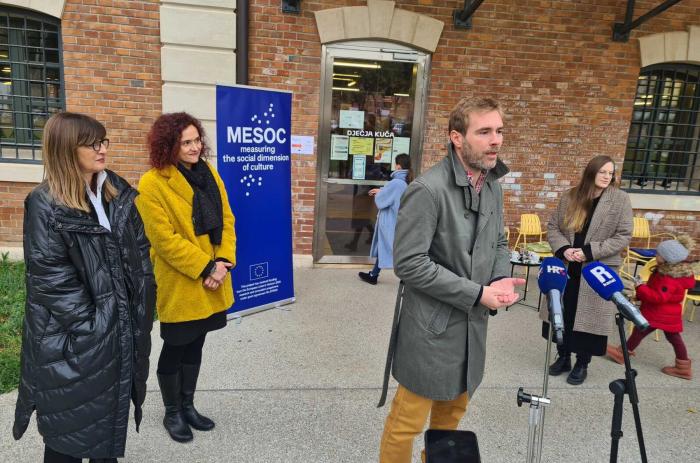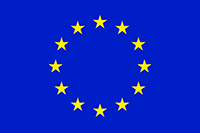Insights from the MESOC International Conference Culture in the post-pandemic period – a chance for growth and new opportunities
Rijeka hosted the international conference "Culture in the Post-Pandemic Period - A Chance for Growth and New Opportunities" on November 30 and December 1, 2022.
Rijeka is one of ten European partner cities within the MESOC project, along with Athens, Barcelona, Cluj-Napoca, Ghent, Issy-les-Moulineaux, Jerez de la Frontera, Milan, Turku, Valencia, and Warsaw. The partner cities have conducted a pilot study as an evaluation tool to assess the social value and impact of cultural policies and practices related to the New European Agenda for Culture's three crossover themes: health and well-being, urban and territorial renovation and regeneration, and citizen inclusion and participation.
The two-day conference focused on urban and territorial renovation and regeneration, as well as citizen inclusion and participation. It was held at two locations in Rijeka revitalized through the Rijeka 2020 - European Capital of Culture project. On the first day, conference lecturers, panellists, and participants were guests in the area of the Children's House within the cultural complex Rikard Benčić. On the first day, Ivan Šarar, the head of the Department of Culture, gave an introduction to the conference as well as a kind of cross-section of the renovation of the Benčić complex.
The mayor of Rijeka, Marko Filipović, stated at the conference's official opening that the Benčić art district, where the first day of the conference took place, is the best example of urban repurposing and revitalization of space.
"A lot of effort and enthusiasm went into the realization of the project to transform the area of the former Rikard Benčić factory into a cultural part of the city, with the Children's House, the Museum of Modern and Contemporary Art, the Museum of the City of Rijeka, and the future City Library," Filipović said.
In addition to the City of Rijeka, the other part of the Croatian team of the MESOC project is the University of Rijeka, whose vice-chancellor for science and culture, Gordan Jelenić, quoting Robert Kennedy's speech from 1955, pointed out that projects like this give us a break from the material aspect of modern life and direct us to things that make it worth living for.
Irena Kregar Šegota, Head of the Ministry of Culture and Media's Sector for Cultural and Artistic Development and former director of the EPK 2020 project in Rijeka, expressed her delight that the conference on this topic is being held in Rijeka, the former European capital of culture, a project with a valuable legacy, numerous results, numerous lessons learned, and experiences worth hearing. She concluded that while the COVID pandemic, which had a significant impact on culture, is mostly over, we are still in a period of instability and abnormality, global trends in which culture is under attack, and that new cultural policies, thinking, and models are required.
Dinko Peračić, the founder of Platform 9.81 and the award-winning author of a series of architectural projects, including projects for public spaces and buildings, particularly cultural buildings, delivered the conference's first lecture.
In addition to his work at the MMSU in Rijeka, he presented others, which he approached as a program creator in addition to his role as an architect, with one common component - for them to become a meeting place and a place for the production and preparation of new works and projects in the field of art and culture. The goal of these spaces is to give their managers and users the freedom to develop and adapt them to their needs, transforming the space from a building into a tool for play and interactivity.
Franco Bianchini of Leeds Metropolitan University presented his research on the effects of the Covid 19 pandemic on the realization of individual cultural capital projects and their subsequent planning.
This extensive research, which is also available online, demonstrated the need for support for the independent cultural and performance scene, which was greatly impacted by the pandemic, as well as the accelerated adoption of digital technology in the implementation of cultural programs, particularly in cities that prepared or implemented European capital programs during the pandemic. According to Bianchini, the study's main finding is that the "measurement of results in culture," particularly during the pandemic, was no longer focused on quantity and numbers but on the quality and uniqueness of the experience for everyone involved.
Peračić and Bianchini also took part in the conference's central panel discussion, "New and/or shared spaces in culture," during which the guests, led by Ida Križaj Leko from Delta LabDelta Lab, discussed the democratization of culture, participatory governance, and citizen involvement.
Božena Stojić of the Belgrade Ministry of Space, Ivan Šarar of the City of Rijeka's Department of Culture, Đurđa Vrljević Šarić, and Bianchini and Peračić concluded that a participatory approach to culture and the management of cultural spaces is a difficult but necessary process.
It sometimes slows decision-making but also provides the necessary interactivity and builds trust in the city's cultural development and cultural life. When asked by the moderator why culture is important, the panellists agreed that it is more important than ever to keep us "awake" and that it is the glue that holds us together during difficult times.
Throughout the rest of the program, participants listened to a panel discussion titled "Traditional vs Digital Approach - Different Perspectives for Culture," in which panellists Božidar Kovačić (University of Rijeka), Edvin Liverić (Croatian Cultural Center in Sušak), Sendy Ghirardi (University of Valencia), and Ilaria Vitellio (CityOpenSource) discussed the relationship between traditional and digital culture, future perspectives, and ways in which MESOC's results can help in the long-term creation of cultural policies. Vitellio demonstrated the CityOpenSource platform, which allows anyone, from cultural institutions to citizens and tourists, to "map" the city by uploading photos, video and audio recordings, and texts that describe their experience with the city, event, or location. Sendy Ghirardi demonstrated the AU Culture Platform, which allows for the evaluation of the impact of cultural events on individuals and serves as a virtual itinerary of events in a city. Božidar Kovačić provided an overview of the document repository being developed as part of the MESOC project, which includes access to a massive number of documents in the field of cultural policies from around the world, while Edvin Liverić demonstrated how the Croatian Cultural Center in Sušak, during the pandemic, stepped into the digital age with VR technology and thus brought culture to groups that might not have had the opportunity to participate in programs in a "normal" situation.
Dragan Čišić of the University of Rijeka introduced the audience to the world of artificial intelligence by presenting the SERAPEUM project, followed by three examples of good practice. Rijeka, through Tanja Kalčić's lecture, "Empowering citizens thru the European Capital of Culture", then Nova Gorica-Gorizia, as an example of the first cross-border capital of culture presented by Stojan Pelko and Neda Rusjan Bric, and Valencia, which through the project "La Ciutat de l "Artista Fallero" stimulated creativity and provided an excellent example of urban development.
The Culture in the post-pandemic period – a chance for growth and new opportunities conference continued on Thursday, December 1, with several more examples of good practice, in the RiHUB space at Ivan Grohovac 1/A starting at 9 a.m. and online.
The second day of the conference began with a technicaal introduction to the MESOC project by Božidar Kovačić from the University of Rijeka (MESOC Technical Insight).
He provided an overview of the MESOC project's basic goals and expected outcomes, including the MESOC Toolkit, a free and "open access" online service for researchers and practitioners (policymakers and cultural workers) that will be used to measure the social value and impact of cultural policies and practices, and the MESOC Document Repository, a searchable collection of thematic publications.
Then, through the first example of good practice, Đurđa Vrljević Šarić of Šibenik Fortress of Culture, demonstrated the process of revitalizing Šibenik from a former heavy industry city to a city of culture.
She explained how the Šibenik Fortress of Culture institution was founded, which now manages three locations, and how funds for building revitalization were planned and realized. She also demonstrated how they used digital technology in their programs to increase citizen participation via a "loyalty" program.
Ewa Orzeszko presented the next city, Lublin, focusing on how cultural summer festivals strengthen the image and brand of the city of Lublin by attracting tourists, empowering local communities, and stimulating urban development. Night of Culture, East of Culture - Different Sounds, Carnaval Sztukmistrzów, and Re:tradition - Jagiellonian Fair were the four most important summer festivals presented.
Sara Vuletić, program director of Novi Sad, European Capital of Culture 2022, presented the basic idea of the "4 New Bridges" program in an online message via the Teams platform, whose basic narrative seeks to leave Novi Sad with new programs, processes, involved citizens, and new spaces that will all contribute to the improvement of the city's cultural life.
Following Novi Sad, participants had the opportunity to attend a workshop led by Politecnico di Milano representatives: prof. Grazia Concilio, Dr. Irene Bianchi, and Dr. Ilaria Tosoni, during which they presented the results of their work with MESOC cities and included participants in the MENIMETER survey.
To conclude the conference, Francesco Molinari, the MESOC project's project manager, provided a brief overview of the conference and what MESOC still expects in the final six months of implementation.


